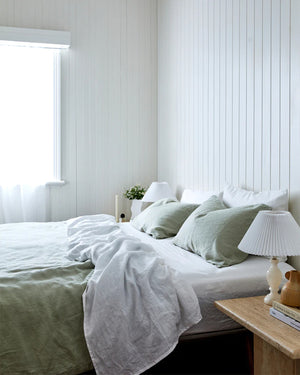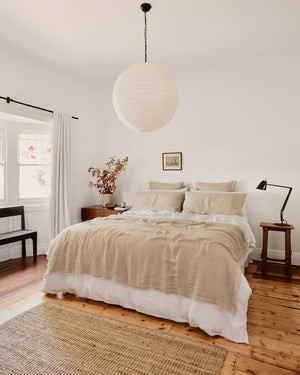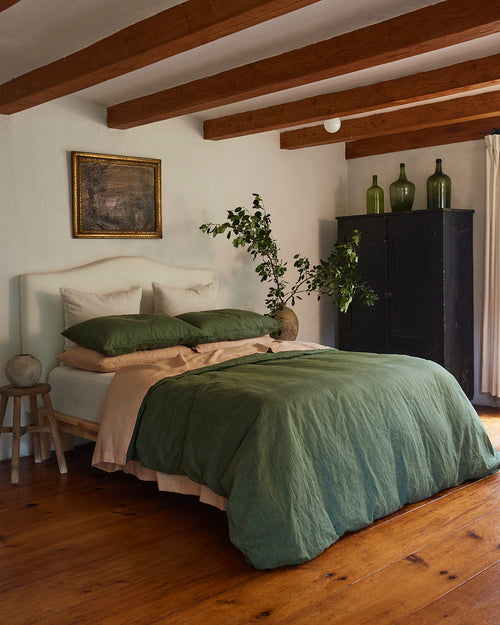
From rearranging your bedroom's layout to changing up your evening routine.
Waking up Cold? Here Are 7 Ways to Stay Warm While You Sleep
From rearranging your bedroom's layout to changing up your evening routine.
The skies are grey, the weather has turned… Winter is well and truly here, folks.
Along with the gloomy sights, and shorter days, comes colder evenings, and in turn, colder beds. Unfortunately for us, as the temperature drops, so does the natural level of cosiness in our bedrooms.
While we're unable to change what the weather's doing outside, we are able to control our bedroom environment. From the positioning of our beds, to what we're wearing to sleep, there are multiple factors which will help us sleep soundly through the colder months.
If you want to maintain maximum warmth in bed and stay as snug as possible while wrapped up in the sheets, here are a few simple tips.
1. Move your bed
This might seem obvious, but if you’re waking up cold it could be because your bed is too close to the window. No matter the thickness of your curtains or the seal of your glass, windows are where the cold air will seep into your house. So if your bed is close to the window – a great choice if you want lots of natural light to wake you up – it could be the reason why you can’t stay warm overnight. Even moving your bed just a small fraction away from the window will make a huge difference when it comes to keeping warm in the evenings.
2. Find the draughts
On that subject, you might want to seek out any draughts in your bedroom, too. No matter how good your windows and doors are, there could be a bit of cold air finding its way into the room. You can cover up draughts in the door frame with a rolled-up towel or a long doorstopper. Just remember that a little bit of circulating air is a good thing for sleep, so if a small draught isn’t bothering you, don’t worry too much about trying to plug it up.
3. Yes, linen will keep you warm in winter
The incredible thing about linen as a fabric is that it has both cooling and heating properties, meaning that it’s the perfect bedding for hot summer nights and cool winter evenings. The reason for this is that linen is a natural insulator, meaning that it both cools down and heats up, depending on your own body temperature. In winter, linen’s hollow fibres will keep you cosy all night long, but if you’re feeling cold when you wake up, think about adding a flat sheet or an extra throw to your bed, just in case.
4. What’s on the floor?
You might be surprised to learn that the type of flooring in your bedroom is a major factor in keeping the space warm in winter. That’s because your floors are the insulators of your room: a hard floor, such as wood or stone, traps the cold in its surface, while a soft floor, like carpet, doesn’t. If you have hard floors in your bedroom, don’t worry, you won’t need to change your floors simply to get more cozy at night. It’s a simple matter of adding a thick, shaggy rug – preferably around your bed, where your feet will rest as you get in and out – to help heat up the room. Choose one made of natural fibres like wool or sheepskin, and the fluffier the better. Just imagine how toasty your feet will feel when you get out of bed on a cold winter morning and place them on that rug.
5. Get warm
If you want to stay warm overnight, one thing you can do before going to bed is get warm. Having a mug of warm tea – caffeine-free, naturally – and a warm shower or bath will help raise your body temperature right before bed, and it has the bonus element of soothing you into circadian rhythms perfect for a good night’s sleep, too. Remember, you want the temperature to be warm, not super hot. This is because if your bath or shower is too hot your body temperature will cool down to cope with the change, rather than warm up.
6. Old fashioned ways are best
Sometimes, though, what you really need is an old fashioned remedy. We’re talking hot water bottles or heat packs, which will warm up your bed in no time. If you don’t have a heat pack and want to make one DIY-style at home, it’s very simple. Find an old sock – preferably a thick and high, over-the-knee style if you’ve got one – and fill it with dry rice or beans. Tie a knot at the end of the sock and voila, you have a heat pack. All you have left to do is microwave it and stick it down the end of your bed.
7. Change your sleepwear
Yes, what you wear in bed really does impact how hot (or cold) you are in it. Summer sleepwear should be easy and breezy to help regulate your temperature overnight, but winter sleepwear should be more efficient at trapping heat near your body. The perfect solution for both? Linen sleepwear!
Linen sleepwear is ag as it naturally regulates your body temperature – great news for anyone who gets really hot or cold at night! If you really feel the cold at night, think about sleeping with warming bed socks, which will help prevent your toes from feeling the brisk evening air.
Get cosy with our favourite winter items.
Enjoyed This?
Discover more winter articles.






















